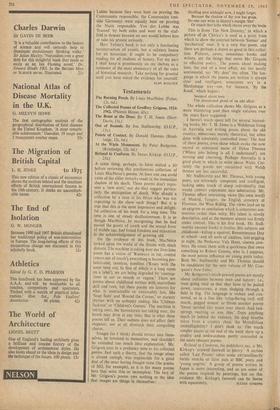Testaments
Refusal to Conform. By James Kirkup. (O.U.P., 25s.) A GOOD thing, perhaps, to have waited a bit before reviewing this posthumous collection of Louis MacNeice's poems. At least one can avoid some of the sillier remarks made in the immediate shadow of his death. These poems don't repre- sent a 'new start,' nor do they suggest particu- larly the anticipation of death. Why should a collection by a man in his fifties who was not expecting to die show such things? But it is true that this is the most impressive and delight- ful collection of his work for a long time. The tone is one of steady disillusionment. It is as though MacNeice, by recognising that he had pasSed the gaiety of youth and the sexual fever of middle age, had found freedom and relaxation in the acknowledgement of growing old.
On the evidence of this book, MacNeice looked upon the world of the Sixties with much distaste. The machine is taking over our lives (one poem has a vision of 'Runways in rut, control towers out of touch'), everything is becoming pre- fabricated, tasteless, scentless ('Roses with the scent bred out, In lieu of which is a long name on a label'), we are being degraded by 'contrap- tions in ear or mouth or vagina.' There are poems about childhood written with marvellous skill and taste, but these poems are laments for what is unattainable or irrevocably lost, like 'Soap Suds' and 'Round the Corner,' or nursery rhymes with an unhappy ending, like 'Château Jackson' or 'Children's Games.' The machine is taking over, the bureaucrats are taking over, the bomb may drop at any time, that is what these poems tell us. Their sadness does not affect their elegance, nor at all diminish their compelling charm.
'Images (so I think) should retract into them- selves, be involved in themselves, and shouldn't be extended too much into explanation,' Mr. Grigson says in a prefatory note to his collected poems. Just such a theory, that the image alone is almost enough, was responsible for a good deal of the most boring Imagist verse (the poems of HD, for example), as it is for many poems here that seem thin or incomplete. The best of Mr. Grigson's poems owe nothing to the idea that images are things in themselves:
Strolling past midnight now, I might forget, Because the shadow of the yew has grain, No one can write in history's margin 'Stet' Or smash that lathe which shaves away the brain.
This is from 'The New Dummy,' in which a picture of de Chirico's is used as a point from which to show the contrast between 'human' and 'mechanical' man. It is a very fine poem, and there are perhaps a dozen as good in this collec- tion. Pictures, caves, sometimes books and writers, are the things that move Mr. Grigson to effective poetry. The poems about making love, the end of a love affair, are too nearly sentimental, say 'My dear' too often. The lan- guage in which the poems are written is always clear and intelligent, sometimes wry in a Hardyesque way—see, for instance, 'By the Road,' which begins:
Sneaked about here The abandoned ghost of an old affair.
The whole collection shows Mr. Grigson as a more interesting poet than single volumes over the years have suggested.
I haven't much space left for several interest- ing books. Mr. T. H. Jones is a Welshman living in Australia and writing pieces about the old country, sometimes merely rhetorical, but often done with admirably controlled irony. The best of these poems, even those which evoke the now sacred or execrated name of Dylan Thomas ('Where you belong is all I understand'), are moving and charming. Perhaps Australia is a good place in which to write about Wales. Cer- tainly the poems not concerned with Welsh themes are less successful.
Mr. Stallworthy and Mr. Thomas, both young poets, are extremely competent and intelligent, lacking some touch of sharp individuality that would convert enjoyment into admiration. Mr. Thomas offers interesting views (his own word) of Madrid, Tangier, the English cemetery at Florence, the West Riding. The views lead on to art epigram or conclusion which is sometimes sen- tentious rather than witty. His talent is mostly descriptive, and at the moment almost too firmly under control. This is his first book. Mr. Stall- worthy (second book) is livelier. His subjects are childhood—killing a squirrel, Remembrance Day at school—and all sorts of oddities, tent-pegging at night, the Peshawar Vale Hunt, cinema cow- boys. He treats them with a quirkiness that owes something to Robert Graves, who is, I suppose, the most potent influence on young poets today. Both Mr. Stallworthy and Mr. Thomas should be candidates for the next volume of Mr. Con- quest's New•Lines.
Mr. Redgrove's much-praised poems are mostly about collisions between man and nature: i.e., trees going mad so that they have to be pulled down, scarecrows, a man sludging through a field in fog. The language is violent and con- torted, as in a line like 'crisp-flaring turf, stiff marsh, gagged stream' or (from another poem) 'Sweat spittled like water over sheets And bed- springs vaulting as you thin.' Does anything much lie behind the violence, the deep breaths taken from a country chest, the Meredithian unintelligibility? I don't think so. The much simpler pieces at the end of the book show tip a crudity and awkwardness partly concealed in the more obscure poems.
Refusal to Conform, his publishers say, is Mr. Kirkup's 'avowed farewell to poetry.' A section called 'Last Poems' takes some extraordinarily feeble smacks or faint pats at BBC poets and 'young angries.' A group of poems written in Japan is more interesting, and so are some of the poems inspired by paintings, but on this evidence Mr. Kirkup's farewell can be borne






























































 Previous page
Previous page